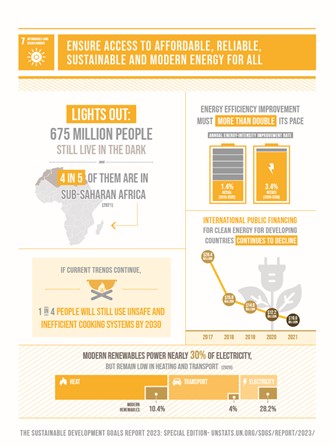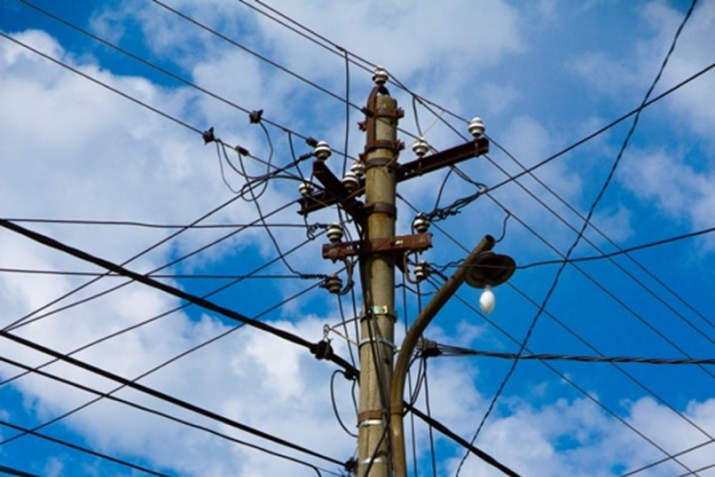November 23, 2023 – ROULA INGLESI-LOTZ
Previously published on GlobalDev in English, French and Spanish on November 15, 2023.
The vast differences in energy infrastructure between the Global North and South intensify disparities in wealth and well-being Policy discussions surrounding these differences tend to focus on improving access to energy, expanding national electricity grids, and tackling energy poverty.
Energy poverty is a complex and multifaceted concept that goes beyond mere access to electricity or not. Demonstrating this complexity, the renowned scientist Amulya Kumar N Reddy defined energy poverty as “the absence of sufficient choice in accessing adequate, affordable, reliable, high-quality, safe and environmentally benign energy services to support economic and human development.”
This blog shows how weak energy infrastructure contributes to energy poverty and hinders the development of countries in the Global South.
Sustainable Development Goals 7 and 10: energy for poverty-reduction
Even the United Nation’s Sustainable Development Goal 7 (SDG7) recognises that energy poverty goes beyond a mere lack of access to energy. Instead, it prioritises universal access to affordable, reliable and sustainable energy.
Indeed, SDG7 (Affordable and Clean Energy) and SDG10 (Reduced Inequalities) are intertwined in their quest for sustainable development. Access to affordable and clean energy (SDG7) helps reduce inequalities by giving crucial resources to vulnerable populations for education, healthcare and economic development. Furthermore, an equitable transition to clean energy, focusing on vulnerable groups, can contribute to SDG10 by reducing economic and well-being gaps.
No country has significantly eliminated poverty without significantly expanding its energy usage. But despite the critical role of sustainable energy in poverty reduction, more than 800 million people remain without access to electricity. Forty per cent of the world’s population still relies on solid fuels for cooking and heating.
Poor individuals also pay a significant price for energy, either in cash or in labour. Furthermore, they spend a far larger proportion of their household income on energy than wealthy people. This is not only because their wages are lower, but also because they use inefficient fuels and equipment.
Figure 1: UN Sustainable Development Goal 7 Progress 2023

Source: UN SDG website
Energy infrastructure challenges and their disproportionate impact on the Global South
Access to energy is improving worldwide (see Figure 1), albeit slowly in the Global South. However, expanding energy infrastructure to serve an increasing number of consumers pressures the systems into breaking points. Frequent power interruptions – or blackouts – caused by unstable energy supply have become a prominent problem in the Global South. Unstable energy supply is not unique to the Global South, but the reasons for the instability are different here than in the Global North. Moreover, the Global North benefits from strong, dependable national energy systems and booming energy markets that have the potential to help prevent and smooth out disruptions. The difficulties for the Global South brought on by these instabilities are made even worse by the growing populations and limited economic opportunities that often prevent proper spending on developing and maintaining energy infrastructure.
South Africa provides a stark example of the difficulties caused by unstable power. Due to recurring energy issues, South Africa frequently engages in load shedding, the regulated reduction of electricity to prevent grid failure. These hiccups disrupt businesses, hospitals, industries and daily life. To adapt, households seek alternative energy sources like solar panels, generators, or traditional fuels like wood. And although it may seem cost-effective for households to put off chores until the electricity is back on, doing so stresses the grid and throws off daily household schedules.
Similarly, Nigeria’s periodic blackouts reveal flaws in its electrical infrastructure. Even though the country is a significant oil producer, less than half of the population has dependable access to electricity. Many homes and businesses have started using generators and inverters to lessen their reliance on the national grid. The recent elimination of fuel subsidies in May 2023 raised prices even further, putting yet more financial strain on people and businesses.
Power outages, development disparities and economic injustice
Countries with weak power infrastructure find it difficult to draw in investment and promote economic expansion. This energy gap widens the developmental gap between the Global South and the more electrified Global North. As a result, the effects of power outages go far beyond the flashing of lights and perpetuate injustices that obstruct global progress.
Global financial conditions have been constrained recently, but the position of low-income countries is even more burdened post-COVID. Countries in the Global South need more access to finance and technologies to support sustainable solutions that both solve the supply-demand mismatch and help them meet climate mitigation targets.
Power outages significantly exacerbate societal inequality within countries too. These disparities need not be ignored. Within a country, uneven access to energy expands the wealth divide. Only the wealthy can afford alternative solutions and other forms of power that ensure uninterrupted comfort and productivity. Disadvantaged communities are pushed further behind, struggling with economic difficulties, restricted access to necessary healthcare services and limited educational possibilities.
Challenges of transitioning to cleaner energy sources
The global shift toward cleaner energy sources holds the promise of a more sustainable and environmentally responsible future. We must recognize that not all regions benefit equally from this change, however. This is demonstrated by the blunt example of Mpumalanga, the South African province that is home to most of the country’s coal-fired power plants. Switching to greener energy sources is essential for reducing climate change, but it also poses the danger of displacing workers in areas like Mpumalanga that depend on coal.
The relationship between the adoption of energy technologies and income gaps is a critical field of inquiry in scholarly discussion. This article emphasizes the tremendous impact that unequal access to reliable energy sources has on socioeconomic inequality at a national and international scale. With our shift towards cleaner, more sustainable energy technologies, it is critical to consider how this transformation may affect wealth gaps. This is particularly true for countries that are highly reliant on traditional energy sources like coal. Future scholarly investigations should delve deeper into the socioeconomic consequences of energy transitions, examining how cleaner energy technologies might either ease or worsen income disparities.
Roula Inglesi-Lotz is a Professor in the Department of Economics at the University of Pretoria, South Africa.
Cover designed by Freepik

Keep on working, great job!
This article offers clear idea in support of the new users
of blogging, that genuinely how to do running a blog.!
I was recommended this blog via my cousin. I am not certain whether this post is written by means of him
as no one else understand such unique about my difficulty.
You’re amazing! Thanks! I saw similar here: Sklep internetowy
You’re so interesting! I do not think I have read through something like that before.
So wonderful to discover someone with unique thoughts
on this subject matter. Seriously.. many thanks for starting this up.
This web site is one thing that is needed on the web, someone with
a bit of originality! I saw similar here: Sklep
Way cool! Some very valid points! I appreciate you writing this article and the
rest of the site is really good. I saw similar here:
E-commerce
Hey there! Do you know if they make any plugins to help with Search Engine Optimization? I’m trying to get my blog
to rank for some targeted keywords but I’m not seeing very good results.
If you know of any please share. Thank you! You can read similar blog here: E-commerce
It’s very interesting! If you need help, look here: ARA Agency
Hi! Do you know if they make any plugins to help with Search Engine Optimization? I’m trying to get
my blog to rank for some targeted keywords
but I’m not seeing very good results. If you know of any please share.
Cheers! You can read similar blog here: Sklep online
Hello! Do you know if they make any plugins to assist with Search
Engine Optimization? I’m trying to get my blog to rank for some targeted keywords but I’m not
seeing very good gains. If you know of any please share. Appreciate it!
You can read similar blog here: Sklep online
Good day! Do you know if they make any plugins to help with SEO?
I’m trying to get my site to rank for some targeted keywords
but I’m not seeing very good gains. If you
know of any please share. Appreciate it! You can read similar article here: Backlink Portfolio
Wow, amazing weblog structure! How lengthy have you ever been blogging for?
you make running a blog look easy. The entire look of your web
site is fantastic, as well as the content material!
You can see similar here e-commerce